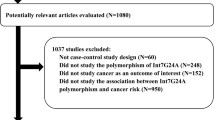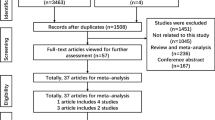Abstract
Inconsistency of the association of polymorphisms of XRCC7 with cancer is noted. Three commonly studied XRCC7 polymorphisms including rs7003908 (T>G), rs7830743 (A>G), and rs10109984 (T>C) were selected to explore their association with risk of development of cancer by meta-analysis of published case–control studies. The results showed that no significant associations with cancer risk were found in any model in terms of rs7003908, rs7830743 and rs10109984 when all studies were pooled into the meta-analysis. But when stratified by cancer type, statistically significantly elevated cancer risk was only found in prostate cancer for rs7003908 (GG vs. TT: OR = 1.845, 95 % CI = 1.178–2.888; dominant model: OR = 1.423, 95 % CI = 1.050–1.929; recessive model: OR = 1.677, 95 % CI = 1.133–2.482). In the subgroup analysis by ethnicity or study design, no significantly increased risks were found for all three polymorphisms. This meta-analysis suggests that XRCC7 rs7003908 polymorphism may contribute to cancer susceptibility for prostate cancer, which is recommended to be included in future large-sample studies and functional assays.
Similar content being viewed by others
References
Jemal A, Bray F, Center MM, Ferlay J, Ward E, Forman D (2011) Global cancer statistics. CA Cancer J Clin 61:69–90
Lichtenstein P, Holm NV, Verkasalo PK et al (2000) Environmental and heritable factors in the causation of cancer—analyses of cohorts of twins from Sweden, Denmark, and Finland. N Engl J Med 343:78–85
Karran P (2000) DNA double strand break repair in mammalian cells. Curr Opin Genet Dev 10:144–150
Hopfner KP, Putnam CD, Tainer JA (2002) DNA double-strand break repair from head to tail. Curr Opin Struct Biol 12:115–122
Jackson SP (2002) Sensing and repairing DNA double-strand breaks. Carcinogenesis 23:687–696
Wang LE, Bondy ML, Shen H et al (2004) Polymorphisms of DNA repair genes and risk of glioma. Cancer Res 64:5560–5563
Hirata H, Hinoda Y, Matsuyama H et al (2006) Polymorphisms of DNA repair genes are associated with renal cell carcinoma. Biochem Biophys Res Commun 342:1058–1062
Hirata H, Hinoda Y, Tanaka Y et al (2007) Polymorphisms of DNA repair genes are risk factors for prostate cancer. Eur J Cancer 43:231–237
Liu Y, Zhang H, Zhou K et al (2007) Tagging SNPs in non-homologous end-joining pathway genes and risk of glioma. Carcinogenesis 28:1906–1913
Hu Z, Liu H, Wang H et al (2008) Tagging single nucleotide polymorphisms in phosphoinositide-3-kinase-related protein kinase genes involved in DNA damage “checkpoints” and lung cancer susceptibility. Clin Cancer Res 14:2887–2891
Siraj AK, Al-Rasheed M, Ibrahim M et al (2008) RAD52 polymorphisms contribute to the development of papillary thyroid cancer susceptibility in Middle Eastern population. J Endocrinol Invest 31:893–899
Wang SY, Peng L, Li CP et al (2008) Genetic variants of the XRCC7 gene involved in DNA repair and risk of human bladder cancer. Int J Urol 15:534–539
Bhatti P, Struewing JP, Alexander BH et al (2008) Polymorphisms in DNA repair genes, ionizing radiation exposure and risk of breast cancer in U.S. Radiologic technologists. Int J Cancer 122:177–182
McKean-Cowdin R, Barnholtz-Sloan J, Inskip PD et al (2009) Associations between polymorphisms in DNA repair genes and glioblastoma. Cancer Epidemiol Biomarkers Prev 18:1118–1126
Gangwar R, Ahirwar D, Mandhani A, Mittal RD (2009) Do DNA repair genes OGG1, XRCC3 and XRCC7 have an impact on susceptibility to bladder cancer in the North Indian population? Mutat Res 680:56–63
Mandal RK, Kapoor R, Mittal RD (2010) Polymorphic variants of DNA repair gene XRCC3 and XRCC7 and risk of prostate cancer: a study from North Indian population. DNA Cell Biol 29:669–674
Long XD, Yao JG, Huang YZ et al (2011) DNA repair gene XRCC7 polymorphisms (rs#7003908 and rs#10109984) and hepatocellular carcinoma related to AFB1 exposure among Guangxi population, China. Hepatol Res 41:1085–1093
Al-Hadyan KS, Al-Harbi NM, Al-Qahtani SS, Alsbeih GA (2012) Involvement of single-nucleotide polymorphisms in predisposition to head and neck cancer in Saudi Arabia. Genet Test Mol Biomarkers 16:95–101
Nasiri M, Saadat I, Omidvari S, Saadat M (2012) Genetic variation in DNA repair gene XRCC7 (G6721T) and susceptibility to breast cancer. Gene 505:195–197
Thakkinstian A, McElduff P, D’Este C, Duffy D, Attia J (2005) A method for meta-analysis of molecular association studies. Stat Med 24:1291–1306
Rohlfs RV, Weir BS (2008) Distributions of Hardy–Weinberg equilibrium test statistics. Genetics 180:1609–1616
Higgins JP, Thompson SG, Deeks JJ, Altman DG (2003) Measuring inconsistency in meta-analyses. BMJ 327:557–560
Egger M, Davey SG, Schneider M, Minder C (1997) Bias in meta-analysis detected by a simple, graphical test. BMJ 315:629–634
Fu YP, Yu JC, Cheng TC et al (2003) Breast cancer risk associated with genotypic polymorphism of the nonhomologous end-joining genes: a multigenic study on cancer susceptibility. Cancer Res 63:2440–2446
Hirschhorn JN, Lohmueller K, Byrne E, Hirschhorn K (2002) A comprehensive review of genetic association studies. Genet Med 4:45–61
Wacholder S, Chanock S, Garcia-Closas M, El GL, Rothman N (2004) Assessing the probability that a positive report is false: an approach for molecular epidemiology studies. J Natl Cancer Inst 96:434–442
Gregoire G, Derderian F, Le Lorier J (1995) Selecting the language of the publications included in a meta-analysis: is there a Tower of Babel bias? J Clin Epidemiol 48:159–163
Acknowledgments
This research was supported by grants from the National Natural Science Foundation of China (81101499), Shanghai Natural Science Foundation (11ZR1407600), and Fudan University Science Foundation for Young Scholars (09FQ76).
Conflict of interest
None declared.
Author information
Authors and Affiliations
Corresponding author
Rights and permissions
About this article
Cite this article
Zhang, J., Wu, Xh. & Gan, Y. Current evidence on the relationship between three polymorphisms in the XRCC7 gene and cancer risk. Mol Biol Rep 40, 81–86 (2013). https://doi.org/10.1007/s11033-012-2018-9
Received:
Accepted:
Published:
Issue Date:
DOI: https://doi.org/10.1007/s11033-012-2018-9




